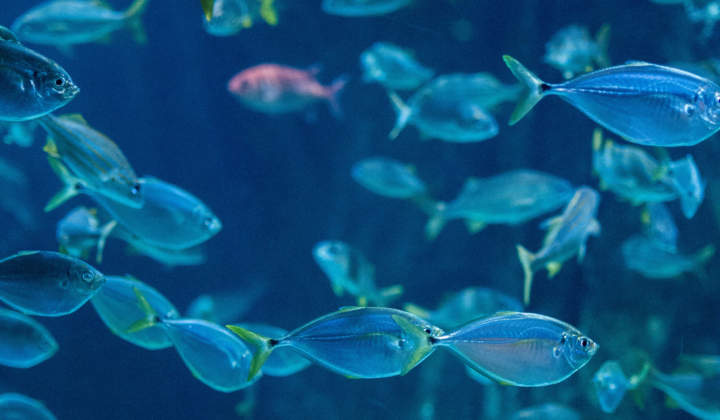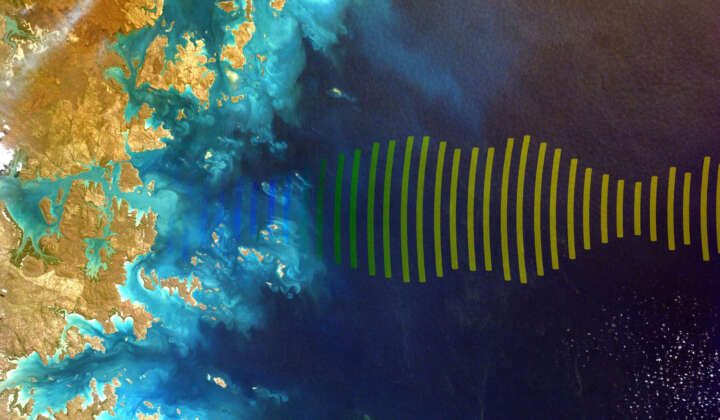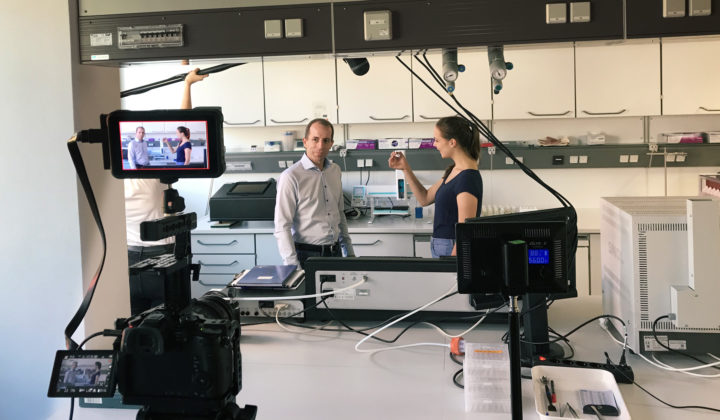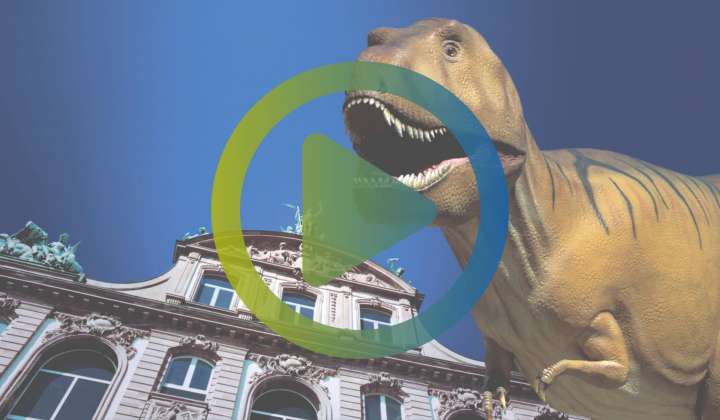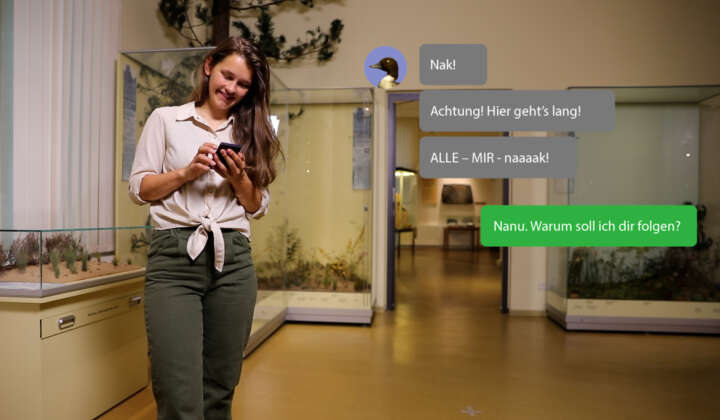
Stellen in Wilhelmshaven
Ref. #02-24001 Wissenschaftliche/r Mitarbeiter/in (m/w/d) (Meeresbiologie / Benthosökologie)
Die Senckenberg Gesellschaft für Naturforschung (SGN) wurde 1817 gegründet und zählt zu den wichtigsten Forschungseinrichtungen rund um die biologische Vielfalt. An den elf Standorten in ganz Deutschland betreiben Wissenschaftler*innen aus über 40 Nationen modernste Forschung auf internationaler Ebene. Senckenberg am Meer in der Hafenstadt Wilhelmshaven ist das nördlichste Institut der Gesellschaft. Es kooperiert mit wichtigen Forschungseinrichtungen der deutschen Meeresforschung sowie Hochschulen und Universitäten. Direkt an der Nordsee gelegen, bietet der Standort Wilhelmshaven außerdem Naherholung in der unberührten Natur sowie ein großes kulturelles Angebot.
Die Senckenberg Gesellschaft für Naturforschung mit Hauptsitz in Frankfurt am Main sucht zum 01.08.2024 für die Abteilung Meeresforschung am Standort Wilhelmshaven eine*n
Wissenschaftliche/r Mitarbeiter/in (m/w/d)
(Meeresbiologie / Benthosökologie)
(Teilzeit 75 %)
Im Rahmen des DAM-Projektes „GEOSTOR: Submarine Kohlendioxid-Speicherung in Geologischen Formationen der Deutschen Nordsee“ soll die Biodiversität und funktionelle Diversität benthischer Endo- und Epifaunagemeinschaften im Arbeitsgebiet A untersucht werden.
Ihre Aufgaben
Im Rahmen eines interdisziplinären Forschungsprojektes werden die Tätigkeitsschwerpunkte in der Probenahme von Endo- und Epifaunaproben in der Nordsee, in der taxonomischen Bestimmung der Endo- und Epifaunaarten sowie der statistischen Analyse von biotischen und abiotischen Daten und der Anwendung von GIS liegen. Außerdem wird die Veröffentlichung der Ergebnisse in Form von wissenschaftlichen ISI-Publikationen und Berichten erwartet. Die Bereitschaft zur Teilnahme an mehrwöchigen Forschungsfahrten auf See wird vorausgesetzt. Für diese Aufgabe suchen wir ein*e Bewerber*in mit abgeschlossenem Masterstudium in Meeresbiologie sowie Erfahrung in der Benthosökologie.
Ihr Profil
- abgeschlossenes Masterstudium mit Schwerpunkt Meeresbiologie
- Erfahrung in Nordseeforschung
- Erfahrung in der Benthosökologie
- Erfahrung in der Taxonomie von Nordsee Endo- und Epifaunaarten
- Erfahrung in Statistik, GIS, Datenbanken
- Erfahrung in und Bereitschaft für Probenahmen auf See
- Teamfähigkeit
Wir bieten
- eine attraktive und herausfordernde Tätigkeit in einer weltweit anerkannten Forschungseinrichtung
- selbstständiges Handeln in einem internationalen, motivierten und professionellen Umfeld
- flexible Arbeitszeiten – mobiles Arbeiten – Unterstützung bei der Kinderbetreuung oder bei der Pflege von Familienangehörigen (zertifiziert durch das „audit berufundfamilie“) – einen eine tarifliche Jahressonderzahlung – tariflichen Urlaubsanspruch – betriebliche Altersvorsorge
Ort: Wilhelmshaven
Beschäftigungsumfang: Teilzeit 75 %
Vertragsart: befristet für eine Dauer von 3 Jahren
Vergütung: TV-H E13
Senckenberg engagiert sich für Vielfalt. Wir profitieren von den unterschiedlichen Expertisen, Perspektiven und Persönlichkeiten unserer Mitarbeiter*innen und freuen uns über jede Bewerbung qualifizierter Kandidat*innen, unabhängig von Alter, Geschlecht oder geschlechtlicher Identität, ethnischer oder kultureller Herkunft, Religion und Weltanschauung, sexueller Orientierung und Identität oder Behinderung. Bewerber*innen mit einer Schwerbehinderung werden bei gleicher Eignung besonders berücksichtigt. Senckenberg unterstützt aktiv die Vereinbarkeit von Beruf und Familie und legt großen Wert auf eine gleichberechtigte und inklusive Kultur der Zusammenarbeit.
Sie möchten sich bewerben?
Dann senden Sie uns Ihre vollständigen und aussagekräftigen Bewerbungsunterlagen (Motivationsschreiben, detaillierter Lebenslauf, Ausbildungs- und Arbeitszeugnisse) in elektronischer Form (als eine zusammenhängende PDF-Datei) bitte stets unter Angabe der Referenznummer #02-24001 bis zum 06.06.2024 an recruiting@senckenberg.de oder bewerben Sie sich direkt auf unserer Homepage über das Online Bewerbungsformular.
Senckenberg Gesellschaft für Naturforschung
Senckenberganlage 25
60325 Frankfurt a.M.
E-Mail: recruiting@senckenberg.de
Für fachliche Rückfragen zur Stelle steht Ihnen Frau Prof. Dr. Ingrid Kröncke: Ingrid.Kroencke@Senckenberg.de, Tel. 04421-9475250 sehr gerne zur Verfügung.
Weitere Informationen über die Senckenberg Gesellschaft für Naturforschung finden Sie unter www.senckenberg.de.
Stellen in Tübingen
Ref.#10-24002 Postdoctoral Position (m/f/d) in Experimental biogeochemistry of aDNA in archaeological deposits
The Senckenberg Society for Nature Research (Senckenberg Gesellschaft für
Naturforschung, SGN) was founded in 1817 and is one of the most important research institutions around biological diversity. At its eleven sites throughout Germany, scientists from over 40 nations conduct cutting-edge research on an international scale. At the site in Tübingen, Baden-Württemberg, the Senckenberg Centre for Human Evolution and Palaeoenvironmant (SHEP) is located in a lively university town with historical flair and numerous local recreational opportunities.
The Senckenberg Centre for Human Evolution and Palaeoenvironment (SHEP) at the University of Tübingen is seeking to fill a
Postdoctoral Position (m/f/d) in
Experimental biogeochemistry of aDNA in archaeological deposits
(full-time position, part time options available)
The position will start as soon as possible and will be primarily hosted in the Geo-Biosphere Interactions working group within the University of Tübingen. The project is nested within the Leibniz Science Campus “Geogenomic Archaeology Campus Tübingen” (GACT). GACT brings together experts from the fields of archaeology, genetics, geosciences, ecology, and microbiology to examine the evolutionary relationship between humans and ecosystem
biodiversity through the multidisciplinary analysis of sedimentary cave archives containing ancient DNA.
Your tasks
- Develop and conduct experiments that test the effect of phosphorous and other elements on the mobility of (ancient) DNA in cave sediments.
- Apply stable and radioactive isotopes combined with geochemical analysis.
- Work with trace amounts of radioactive phosphorous within state-of-the-art radionuclide facilities.
- Analysis and interpretation of geoarchaeological samples from Pleistocene cave deposits.
Your profile
- Doctorate in archaeological sciences, geoarchaeology, geosciences/geology, soil science, paleogenetics, biology, bioinformatics or a related field.
- The ideal applicant (f/m/d) will have knowledge in biogeochemical cycles in soils and/or sediments, and a genuine interest in the human past and linking their data with biomolecular analysis.
- Previous experience in experimental applications of isotopic tracers, and soil and/or sediment geochemical analysis is recommended.
- Good communication skills in order to work in a highly collaborative and international environment
- Very good command of written and spoken English. Knowledge of German is appreciated but is not a requirement.
We offer
- a varied and interesting job in a globally recognized research institution
- independent action in an international and professional environment
- flexible working hours – possibility of mobile working – support with childcare or caring for family members (certified by the „audit berufundfamilie“) – Senckenberg badge in combination with free admission to numerous municipal museums – a collectively agreed
annual special payment – collectively agreed vacation entitlement – company pension plan
Place of employment: Tübingen (Baden-Württemberg)
Working hours: Full-time (39,5 hours/week), part time options are available
Type of contract: 2 years with possibility of extension
Pay: according to the public collective agreement TV-L E13
Senckenberg is committed to diversity. We benefit from the different expertise, perspectives and personalities of our staff and welcome every application from qualified candidates, irrespective of age, gender, ethnic or cultural origin, religion and ideology, sexual orientation and identity or disability. Women are particularly encouraged to apply, as they are underrepresented in the field of this position; in the case of equal qualifications and suitability they will be given preference. Applicants with a severe disability (“Schwerbehinderung”) will be given special consideration in case of equal suitability. Senckenberg actively supports the compatibility of work and family and places great emphasis on an equal and inclusive work culture.
You would like to be part of our team?
Please submit your complete an meaningful application including a letter of motivation, a CV, scans of academic transcripts, and contact details of two potential academic referees as a single PDF file. Applications should be submitted electronically no later than the 02nd of June 2024 and addressed to recruiting@senckenberg.de quoting the reference number #10-24002.
Senckenberg Gesellschaft für Naturforschung
Senckenberganlage 25
60325 Frankfurt a.M.
E-Mail: recruiting@senckenberg.de
For scientific inquiries regarding the position please contact the GACT Scientific Coordinator: Dr. Gerlinde Bigga, E-Mail: gerlinde.bigga@senckenberg.de.
Stellen in Jena
Ref.#13-24002 Lichen or Bryophyte taxanomist (m/f/d)
The Senckenberg Gesellschaft für Naturforschung (SGN) is a member of the Leibniz Association and is based in Frankfurt am Main, Germany. SGN conducts natural history research with more than 800 employees and research institutions in seven federal states and is committed to study the causes and effects of biodiversity loss in the Anthropocene. As part of our strategic development, we launched an ambitious long-term research effort in “Anthropocene Biodiversity Loss” encompassing the modules “Collectomics”, “Biodiversity Genomics”, and “Solution Labs”. Objectives include the transformation of natural history collections into the digital era, studying biodiversity from the genome to the ecosystem levels and offering exploratory spaces for science and society to develop common solutions to Anthropocene challenges.
Within this research effort, Senckenberg takes innovative steps in collection-based research and data science. The objective of “Collectomics” is to make current and future natural history collections digitally accessible and to improve integration and collaboration across regions, collections, and disciplines. This will enable broader, more holistic biodiversity research, for the benefit of people and nature.
The Herbarium Haussknecht, part of the Seckenberg Centre for Plant Form and Function in Jena, Thuringia is seeking a
Lichen or bryophyte taxonomist (m/f/d)
(part-time 50%)
Your tasks
- Identification of potential type-specimens in the lichen and bryophyte collections
- Verification of type status based on literature research
- Annotating and preparing type collections for digitization
- Updating our collection data base
Your profile
- Sc. degree in biosciences
- Strong background in plant taxonomy and nomenclature
- Experience in collection-based research and familiarity with general herbarium etiquette
- Ability to work in a team, but also to independently drive project forward
What is awaiting you?
A workplace in a central location with good transport connections in the heart of Jena – flexible working hours – opportunities for mobile working – support with childcare or caring for family members (certified by the „audit berufundfamilie“) – a leave of 30 days per year – special annual payment – company pension scheme.
Place of employment: Jena, Germany
Working hours: Part-time (20 hours/week)
Type of contract: Limited to 1 year
Salary: according to the German collective agreement of the federal states (pay grade E 13, TV-L)
Senckenberg is committed to diversity. We benefit from the different expertise, perspectives and personalities of our staff and welcome every application from qualified candidates, irrespective of age, gender, ethnic or cultural origin, religion and ideology, sexual orientation and identity or disability. Applicants with disabilities (“Schwerbehinderung”) will be given preferential consideration in case of equal suitability. Senckenberg actively supports the compatibility of work and family and places great emphasis on an equal and inclusive work culture.
How to apply?
Please send us your application documents containing
- a letter of motivation
- a CV with publication list
- a summary of previous experience related to herbarium work
- a copy of your MSc certificate
in electronic form (as a single PDF file) by June 6th to recruiting@senckenberg.de quoting the reference number ref. #13-24002 or apply directly on our homepage using the online application form.
Senckenberg Gesellschaft für Naturforschung
Senckenberganlage 25
60325 Frankfurt a.M.
E-Mail: recruiting@senckenberg.de
For more information regarding the scientific aspects of the position, please contact Jörn Hentschel, joern.hentschel@senckenberg.de.
Further information about the Senckenberg Gesellschaft für Naturforschung can be found at www.senckenberg.de.
Stellen in Frankfurt
Ref. #01-24017 PhD position – Research Assistant (m/f/d) in botany and molecular evolution (part-time 65% / limited to 3 years)
The Senckenberg Gesellschaft für Naturforschung (SGN) was founded in 1817 and is one of the most important research institutions in the field of biodiversity. At its eleven locations throughout Germany, scientists from over 40 nations conduct cutting-edge research at an international level. At the Senckenberg Research Institute and Natural History Museum Frankfurt we seek to fill the position of
PhD position – Research Assistant (m/f/d) in botany and molecular evolution (part-time 65% / limited to 3 years)
The research associate will have the opportunity to work towards a PhD in the field of ‘Biodiversity Genomics of Plants and their Interactions’ and will join the Department of Botany and Evolutionary Research. The successful applicant benefits from close collaboration with the Professorship in Biodiversity of Angiosperms at Goethe University Frankfurt and the LOEWE Center for Translational Biodiversity Genomics. The successful candidate will investigate the evolution of the repeatom of parasitic plants and their hosts using comparative genomic approaches. The project will be conducted within an interdisciplinary collaboration framework and contribute to Senckenberg’s efforts in furthering its overall mission as well as to decipher Anthropocene biodiversity changes.
Your Responsibilities
- Perform research on selected lineages of parasitic plants
- perform individual and comparative genomic analyses of the repeatom landscape
- reconstruct evolutionary trajectories and genome dynamics
- investigate intercellular and horizontal gene transfer
- publish research findings in peer-reviewed journals and present results at conferences
- collaborate with other working groups and other researchers involved in the project
Your profile
- Master’s degree in biology, or a related field
- Background in botany, evolutionary biology and genomics
- Good communication skills in English, both written and verbal
- Knowledge of German is advantageous
- Computer literacy, specifically skillful use of MS office packages, graphics software, knowledge in Phyton and R is beneficial
- Ability to work independently and as part of a team
- Strong organizational skills and attention to detail
We offer you
- a challenging and rewarding research project in the field of plant biodiversity genomics
- opportunities to present research findings at conferences and publish in peer-reviewed journals
- Flexible working hours – leave of absence due to family reasons (“audit berufundfamilie”) – annual special payment – company pension scheme – Senckenberg badge for free entry in museums in Frankfurt, the Zoo, and Palmengarten – leave of 30 days/year
Place of employment: Frankfurt am Main (Hesse)
Working hours: Part time (65%)
Type of contract: 3 years, starting as soon as possible
Salary: According to the German collective agreement TV-H (Pay grade E 13)
Senckenberg is committed to diversity. We benefit from the different expertise, perspectives and personalities of our staff and welcome every application from qualified candidates, irrespective of age, gender, ethnic or cultural origin, religion and ideology, sexual orientation and identity or disability. Women are particularly encouraged to apply, as they are underrepresented in the field of this position; in the case of equal qualifications and suitability they will be given preference. Applicants with a severe disability will be given special consideration in case of equal suitability. Senckenberg actively supports the compatibility of work and family and places great emphasis on an equal and inclusive work culture.
How to apply
Please send us your complete and informative application documents (letter of motivation, detailed CV, academic certification, transcripts and grades, contact details of two references) mentioning the reference of this job offer (ref. #01-24017) until 24.05.2024, by e-mail, attachment in a single pdf document to: recruiting@senckenberg.de or apply directly on our homepage using the online application form.
Senckenberg Gesellschaft für Naturforschung
Senckenberganlage 25
60325 Frankfurt
E-Mail: recruiting@senckenberg.de
For information regarding the scientific aspects of the project please contact the project leader Prof. Dr. Stefan Wanke (Stefan.wanke@senckenberg.de).
Ref. #01-24011 Collection Scientist and Curator of Marine Invertebrates (m/w/d)
The Senckenberg Gesellschaft für Naturforschung (SGN) was founded in 1817 and is one of the most important research institutions in the field of biodiversity. At its eleven locations throughout Germany, scientists from almost 40 nations conduct cutting-edge research on an international scale. The Society’s headquarter is in the Main metropolis of Frankfurt in the heart of Germany. This is also where one of the best-known Senckenberg facilities, the Senckenberg Natural History Museum, is located.
For our extensive collection of Marine Invertebrates at our location in Frankfurt, starting ideally on 01st of January 2025, we are looking for a
Collection Scientist and Curator of Marine Invertebrates (m/w/d)
(tenure-track, full time / part time options available)
We are looking for an internationally recognized invertebrate zoologist with an excellent research record in integrative taxonomy, systematics, evolutionary and/or ecological research on marine invertebrate organisms. The ideal candidate will apply modern approaches, using innovative methods to unlock scientific information from museum specimens, e.g. through imaging approaches and/or molecular analyses.
The position will include responsibility and oversight for permanent scientific collections of the Senckenberg Research Institute and Natural History Museum Frankfurt. In particular, we are looking for candidates with an expertise in corals, or sponges, but applications are also welcome from candidates with expertise in other organismal groups that align with existing collection strengths, such as bryozoans or echinoderms. The proposed research program should be collections-based and complement the overall Senckenberg Marine Research portfolio and strategy.
Your tasks:
- Conduct innovative collection-based research on the taxonomy, systematics and biology of marine invertebrates
- Supporting the Senckenberg Collectomics concept: research using new approaches for low-invasive mass digitisation and/or the use of extended specimens for modelling
- Develop the collections and associated resources at the Senckenberg Research Institute and Natural History Museum Frankfurt
- Foster our collections as important international research tool through international networking, and development and growth of the specimen collections
- Secure external research funds
- Actively publish results of your research in international scientific journals
- Participate in collaborative marine research and expeditions
- Supervise students at undergraduate and postgraduate levels
- Promote collections-based research on marine invertebrates through national and international initiatives and partnerships (e.g. IUCN Red List, UN Decade of Ocean Science)
Your profile:
- Doctoral degree in organismal biology/zoology or a related field
- Expert knowledge of a relevant group of organisms and their systematics
- Experience in curating and using invertebrate research collections
- A research plan to leverage innovative research methods, such as genomic or imaging methods in a collections context
- Outstanding research record adequate to your career stage
What can you expect?
- A vibrant, international team of scientists with collection-based research programs, focussed on curiosity-driven research and the preservation of Earth’s biodiversity
- Excellent infrastructures and collaborations opportunities, e. g. in morphology, genomics, evolutionary biology, (paleo-)ecology
- An attractive and challenging position in a research institution of international standing
- Opportunities to participate in teaching and outreach activities, e.g. in our museum and with collaborating universities
- A salary that reflects the responsibilities of the position and the experience of the candidate, based on the collective agreement for public service in the state of Hesse
- Life in a vibrant, internationally-minded city (population 750.000), a global hub for transport and culture
- Flexible working hours – annual special payment – company pension scheme – 30 days holidays – discounted public transportation in the Rhein-Main area – strong support for work/life balance (certified by “Audit Berufundfamilie”).
- Secure employment that is robust to economic or health crises
Place of employment: Frankfurt am Main, Germany
Working hours: full time (40 hours/week) / part time options are available
Type of contract: initially limited for a period of 3 years, an extension with the option of permanent position is dependent on positive evaluation (tenure track)
Salary: according to the German collective agreement of the State of Hesse (pay grade E 13, TV-H)
Senckenberg is committed to diversity. We benefit from the different expertise, perspectives and personalities of our staff and welcome every application from qualified candidates, irrespective of age, gender, ethnic or cultural origin, religion and ideology, sexual orientation and identity or disability. Applicants with disabilities (“Schwerbehinderung”) will be given preferential consideration in case of equal suitability. Senckenberg actively supports the compatibility of work and family and places great emphasis on an equal and inclusive work culture.
How to apply:
Please send us your application documents containing
- a letter of motivation
- a CV with publication list and contact information for at least two references
- a summary of previous research experience (max 1 page)
- copies of PhD and MSc certificates
in electronic form (as a single PDF file) by 30th of May 2024 to recruiting@senckenberg.de quoting the reference number ref. #01-24011 or apply directly on our homepage using the online application form.
Senckenberg Gesellschaft für Naturforschung
Senckenberganlage 25
60325 Frankfurt a.M.
E-Mail: recruiting@senckenberg.de
For more information, please contact Prof. Dr. Angelika Brandt via email: angelika.brandt@senckenberg.de
Further information about the Senckenberg Gesellschaft für Naturforschung can be found at www.senckenberg.de.
Ref.#12-24004 Postdoctoral Researcher (m/f/d) in Adaptation Genomics
The Senckenberg Gesellschaft für Naturforschung (SGN) is a member of the Leibniz Association and is based in Frankfurt am Main, Germany. The LOEWE Centre for Translational Biodiversity Genomics (LOEWE- TBG), is a joint venture of the Senckenberg Gesellschaft für Naturforschung (SGN) with five partner institutes from the Federal State of Hesse, aiming to intensify biodiversity genomics in basic and applied research. We establish a new and taxonomically broad genome collection to study genomic and functional diversity across the tree of life and make genomic resources accessible for societal demand driven applied research.
For the LOEWE funded Centre for Translational Biodiversity Genomics Centre (LOEWE-TBG), in the Genomic Biomonitoring project area, and starting as soon as possible, we are looking for a
Postdoctoral Researcher (m/f/d) in Adaptation Genomics
(full time / part-time options available)
We are looking for a talented and motivated applicant to work on a project on animal adaptation genomics using whole genome data with a focus on understanding species adaptation to extreme environmental conditions. Strong research interest in comparative or population genomics of animals will be favorable. The position is part of the Bista lab (Meta-OMICS group) and will be based in Frankfurt am Main. In the Meta-OMICS group, we work on environmental and comparative genomics focusing of animal taxa, including both vertebrates and invertebrates. We are part of TBG which maintains laboratory and bioinformatics infrastructures for reference genome sequencing at large scale, including genome lab, robotic systems for high-throughput sample processing and HPC clusters for data analysis.
Your profile
• PhD in Biology, Genomics, Bioinformatics or a related field
• Strong interest and skills on comparative, population or adaptation genomics
• Experience with analysis of large genomic and/or environmental datasets, Linux environment and shell scripting
• Experience with long read data analysis, transposon and gene family evolution is a plus
• Excellent written and oral communication skills in English
Place of employment: Frankfurt am Main
Working hours: full time / part-time optional (min 80%, 32 hours/week)
Type of contract: The position is available to start as soon as possible, and is limited to 1 year, with possibility of extension.
Salary: according to the collective agreement of the State of Hesse
(pay grade E 13, TV-H)
What is awaiting you?
• An interesting task in a dynamic team of researchers in an international research group and joining the LOEWE TBG excellence centre with its 20 new research groups
• Flexible working hours – opportunities for mobile working – leave of absence due to family reasons (certified by “auditberufundfamilie”) – parent-child office – annual special payment – company pension scheme – Senckenberg badge for free entry in museums in Frankfurt. – leave of 30 days/year
Senckenberg is committed to diversity. We benefit from the different expertise, perspectives and personalities of our staff and welcome every application from qualified candidates, irrespective of age, gender, ethnic or cultural origin, religion and ideology, sexual orientation and identity or disability. Women are particularly encouraged to apply, as they are underrepresented in the field of this position; in the case of equal qualifications and suitability they will be given preference. Applicants with disabilities (“Schwerbehinderung”) will be given preferential consideration in case of equal suitability. Senckenberg actively supports the compatibility of work and family and places great emphasis on an equal and inclusive work culture. The employer for this position is the Senckenberg Gesellschaft für Naturforschung.
How to apply
Please send us your complete application documents as a single PDF file including: CV, list of publications, letter of motivation, academic transcripts, and contact details of two potential referees, by email at recruiting@senckenberg.de, quoting job reference number #12-24004, or apply directly on our homepage using the online application form.
Applications to be submitted by 05.05.2024
Senckenberg Gesellschaft für Naturforschung
Senckenberganlage 25
60325 Frankfurt a.M.
E-Mail: recruiting@senckenberg.de
For more information about the position and requirements please contact Dr. Iliana Bista iliana.bista@senckenberg.de
For more information about the Senckenberg Gesellschaft für Naturforschung, please visit www.senckenberg.de
For more information about the LOEWE-TBG, please visit https://tbg.senckenberg.de
Ref.#01-24008 Lichen or Bryophyte Taxonomist (m/w/d)
The Senckenberg Gesellschaft für Naturforschung (SGN) is a member of the Leibniz Association and is based in Frankfurt am Main, Germany. SGN conducts natural history research with more than 800 employees and research institutions in seven federal states and is committed to study the causes and effects of biodiversity loss in the Anthropocene. As part of our strategic development, we launched an ambitious long-term research effort in “Anthropocene Biodiversity Loss” encompassing the modules “Collectomics”, “Biodiversity Genomics”, and “Solution Labs”. Objectives include the transformation of natural history collections into the digital era, studying biodiversity from the genome to the ecosystem levels and offering exploratory spaces for science and society to develop common solutions to Anthropocene challenges.
Within this research effort, Senckenberg takes innovative steps in collection-based research and data science. The objective of “Collectomics” is to make current and future natural history collections digitally accessible and to improve integration and collaboration across regions, collections, and disciplines. This will enable broader, more holistic biodiversity research, for the benefit of people and nature.
The Department of Botany and Molecular Evolution in Frankfurt, starting as soon as possible, is looking for a
Lichen or Bryophyte Taxonomist (m/f/d)
(part-time 50%)
Your tasks
• Identification of potential type-specimens in the lichen and bryophyte collections
• Verification of type status based on literature research
• Annotating and preparing type collections for digital scanning
• Updating our collection data base in consultation with herbarium technicians
Your Profile
• M.Sc. degree in biosciences or a similar field
• Strong background in lichen taxonomy and fungal nomenclature
• Experience in collection-based research and familiarity with general herbarium etiquette
• Ability to work in a team, but also independently drive projects forward
What is awaiting you?
A workplace in a central location with good transport connections in the heart of Frankfurt – flexible working hours – opportunities for mobile working – support with childcare or caring for family members (certified by the „audit berufundfamilie“) – Senckenberg badge for free entry in museums, the Zoo and Palmengarten in Frankfurt – a leave of 30 days per year – special annual payment – company pension scheme.
Place of employment: Frankfurt am Main, Germany
Working hours: Part-time (20 hours/week)
Type of contract: Limited to 1 year
Salary: according to the German collective agreement of the State of Hesse (pay grade E 13, TV-H)
Senckenberg is committed to diversity. We benefit from the different expertise, perspectives and personalities of our staff and welcome every application from qualified candidates, irrespective of age, gender, ethnic or cultural origin, religion and ideology, sexual orientation and identity or disability. Applicants with disabilities (“Schwerbehinderung”) will be given preferential consideration in case of equal suitability. Senckenberg actively supports the compatibility of work and family and places great emphasis on an equal and inclusive work culture.
How to apply?
Please send us your application documents containing
– a letter of motivation
– a CV with publication list
– a summary of previous experience related to herbarium work
– a copy of your MSc certificate
in electronic form (as a single PDF file) by May 05th to recruiting@senckenberg.de referring to the reference number Ref. #01-24008 or apply directly on our homepage using the online application form.
Senckenberg Gesellschaft für Naturforschung
Senckenberganlage 25
60325 Frankfurt a.M.
E-Mail: recruiting@senckenberg.de
For more information please contact Dr. Christian Printzen christian.printzen@senckenberg.de
Further information about the Senckenberg Gesellschaft für Naturforschung can be found at www.senckenberg.de.
Ref.#01-24009 Scientist and Curator of Vascular Plants (m/w/d/)
The Senckenberg Gesellschaft für Naturforschung (SGN) was founded in 1817 and is one of the most important research institutions in the field of biodiversity. At its eleven locations throughout Germany, scientists from almost 40 nations conduct cutting-edge research on an international scale. The Society’s headquarter is in the Main metropolis of Frankfurt in the heart of Germany. This is also where one of the best-known Senckenberg facilities, the Senckenberg Research Institute and Natural History Museum, is located.
For our Division Botany and Molecular Evolution and the Herbarium Senckenbergianum at our location in Frankfurt, starting as soon as possible, we are looking for a
Scientist and Curator of Vascular Plants (m/w/d/)
(tenure-track, full time / part time options available)
The Senckenberg Research Institute and Natural History Museum Frankfurt is looking for an internationally recognized botanist with a strong track record of research in evolution of vascular plants, including topics such as taxonomy, phylogenetics, biogeography, trait evolution or evolution of biological interactions. The ideal candidate will apply innovative methods to generate scientific knowledge from natural history collections, e.g. through imaging approaches or molecular analyses, and is open for research cooperations with colleagues from related disciplines. The research programme should complement the scientific expertise within the Department of Botany in Frankfurt and Herbarium Senckenbergianum as a whole.
The Herbarium Senckenbergianum is a de-centralized scientific unit with collections in Frankfurt/Main (FR), Görlitz (GLM), Jena (JE), Weimar (IQW), and Wilhelmshaven. The position will include curatorial responsibility for the vascular plant collection of the Herbarium Senckenbergianum (FR), including the development and maintenance of associated online data bases and portals.
Your tasks:
• Conduct collection-based research in the broad field of vascular plants
• Develop the collections and associated resources of the Herbarium Senckenbergianum (FR)
• Highlight our collections as an important international research infrastructure through international networking, and development and growth of the herbarium collections
• Secure external research funds
• Publish results of your research in international scientific journals
• Participate in academic teaching and mentoring of students and graduates at Goethe-University Frankfurt as well as the Senckenberg-School for Technical Assistants
• Communicate with external stakeholders such as scientific associations, conservation agencies, local and regional authorities
Your profile:
• Doctoral degree in organismal biology/botany or a related field
• Expert knowledge of a relevant group of organisms and their systematics
• Excellent academic track record adequate to your career stage
• A research plan to implement innovative research methods, such as genomics or imaging methods, in a collections context
• Experience in curating and using research collections is desirable
What can you expect?
• A vibrant, international team of scientists with collection-based research programs, focussed on curiosity-driven research and the preservation of Earth’s biodiversity
• Excellent infrastructures and collaborations opportunities, e. g. in morphology, genomics, evolutionary biology, (paleo-)ecology
• An attractive and challenging position in a research institution of international standing
• Opportunities to participate in teaching and outreach activities, e.g. in our museum and with collaborating universities
• A salary that reflects the responsibilities of the position and the experience of the candidate, based on the collective agreement for public service in the state of Hesse
• Life in a vibrant, internationally-minded city (population 750.000), a global hub for transport and culture
• Flexible working hours – mobile office – annual special payment – company pension scheme – 30 days holidays – strong support for work/life balance (certified by “Audit Berufundfamilie”).
• Secure employment that is robust to economic or health crises
Place of employment: Frankfurt am Main, Germany
Working hours: Full-time (40 hours/week), part time options are available
Type of contract: initially limited for a period of 3 years, an extension with the option of permanent position is dependent on positive evaluation (tenure track)
Ideally, the contract should start no later than the end of 2024.
Salary: according to the German collective agreement of the State of Hesse (pay grade E 13, TV-H)
Senckenberg is committed to diversity. We benefit from the different expertise, perspectives and personalities of our staff and welcome every application from qualified candidates, irrespective of age, gender, ethnic or cultural origin, religion and ideology, sexual orientation and identity or disability. Women are particularly encouraged to apply, as they are underrepresented in the field of this position; in the case of equal qualifications and suitability they will be given preference. Applicants with disabilities (“Schwerbehinderung”) will be given preferential consideration in case of equal suitability. Senckenberg actively supports the compatibility of work and family and places great emphasis on an equal and inclusive work culture.
How to apply?
Please send us your application documents containing
– a letter of motivation
– a CV with publication list
– a research concept
– copies of certificates and diplomas
in electronic form (as a single PDF file) by May 20th to recruiting@senckenberg.de referring to the reference number ref. #01-24009 or apply directly on our homepage using the online application form.
Senckenberg Gesellschaft für Naturforschung
Senckenberganlage 25
60325 Frankfurt a.M.
E-Mail: recruiting@senckenberg.de
For more information please contact Dr. Christian Printzen christian.printzen@senckenberg.de.
Further information about the Senckenberg Gesellschaft für Naturforschung can be found at www.senckenberg.de.
Ref.#01-24010 Wissenschaftliche*n Mitarbeiter*in (m/w/d) mit Schwerpunkt Drittmitteleinwerbung im Bereich Botanik
Die Senckenberg Gesellschaft für Naturforschung (SGN) wurde 1817 gegründet und zählt zu den wichtigsten Forschungseinrichtungen rund um die biologische Vielfalt. An den elf Standorten in ganz Deutschland betreiben Wissenschaftler*innen aus fast 40 Nationen modernste Forschung auf internationaler Ebene. Hauptsitz der Gesellschaft ist die Mainmetropole Frankfurt im Herzen Deutschlands. Hier befindet sich auch eine der bekanntesten Senckenberg-Einrichtungen, das Senckenberg Forschungsinstitut und Naturmuseum.
Zur Unterstützung der Sektionsleitung Kryptogamen sucht die Abteilung Botanik und Molekulare Evolutionsforschung an unserem Standort in Frankfurt am Main zum nächstmöglichen Termin eine*n
Wissenschaftliche*n Mitarbeiter*in (m/w/d) mit Schwerpunkt Drittmitteleinwerbung im Bereich Botanik
(Teilzeit, 20h)
Ihre Aufgaben
• Verfassen von Drittmittelanträgen zu bestehenden Projektideen
• Durchführung von damit zusammenhängenden Recherchen und vorbereitenden Datenanalysen
• Kommunikation mit der Wissenschaftskoordination und Förderorganisationen
Ihre Qualifikationen
• Abgeschlossenes Studium (M.Sc.) im Bereich der Biowissenschaften oder einem verwandten Studiengang
• Gute organisatorische und kommunikative Fähigkeiten und Freude an Teamarbeit
• Sehr gute Kenntnisse in den üblichen IT-Tools wie z.B. Office
• Sehr gute Kenntnisse der deutschen Sprache und exzellente schriftliche Ausdrucksfähigkeit
• Gute Englisch-Kenntnisse
• Vorteilhaft sind Kenntnisse zu Biologie, Diversität und Artenschutz von Moosen und/oder Flechten
Wir bieten
• eine attraktive und herausfordernde Tätigkeit in einer weltweit anerkannten Forschungseinrichtung
• selbstständiges Handeln in einem internationalen, motivierten und professionellen Umfeld
• flexible Arbeitszeiten – mobiles Arbeiten – Unterstützung bei der Kinderbetreuung oder bei der Pflege von Familienangehörigen (zertifiziert durch das „audit berufundfamilie“) – einen Dienstausweis in Verbindung mit kostenfreiem Eintritt in zahlreiche städtischen Museen – eine tarifliche Jahressonderzahlung – tariflichen Urlaubsanspruch – betriebliche Altersvorsorge
Ort: Frankfurt am Main
Beschäftigungsumfang: Teilzeit (20 Stunden/Woche)
Vertragsart: befristet (1 Jahr)
Vergütung: Tarifvertrag des Landes Hessen (TV-H 13)
Senckenberg engagiert sich für Vielfalt. Wir profitieren von den unterschiedlichen Expertisen, Perspektiven und Persönlichkeiten unserer Mitarbeiter*innen und freuen uns über jede Bewerbung qualifizierter Kandidat*innen, unabhängig von Alter, Geschlecht oder geschlechtlicher Identität, ethnischer oder kultureller Herkunft, Religion und Weltanschauung, sexueller Orientierung und Identität oder Behinderung. Bewerber*innen mit einer Schwerbehinderung werden bei gleicher Eignung besonders berücksichtigt. Senckenberg unterstützt aktiv die Vereinbarkeit von Beruf und Familie und legt großen Wert auf eine gleichberechtigte und inklusive Kultur der Zusammenarbeit.
Sie möchten sich bewerben?
Dann senden Sie uns Ihre vollständigen und aussagekräftigen Bewerbungsunterlagen
– Anschreiben
– detaillierter Lebenslauf mit Referenzen
– Zeugnisse
in elektronischer Form (als zusammenhängende PDF-Datei) bitte unter Angabe der Referenznummer #01-24009 bis zum 12.05.2024 an recruiting@senckenberg.de oder bewerben Sie sich direkt auf unserer Homepage über das Online Bewerbungsformular.
Senckenberg Gesellschaft für Naturforschung
Senckenberganlage 25
60325 Frankfurt a.M.
E-Mail: recruiting@senckenberg.de
Für fachliche Rückfragen zur Stelle steht Ihnen Herr Dr. Christian Printzen unter christian.printzen@senckenberg.de sehr gerne zur Verfügung.
Weitere Informationen über die Senckenberg Gesellschaft für Naturforschung finden Sie unter www.senckenberg.de.
Ref. #12-24005 ERC-funded PhD and Postdoc Positions in Comparative Genomics
ERC-funded PhD and Postdoc Positions in Comparative Genomics
(full time / part-time options available)
The Hiller Lab at the LOEWE Center for Translational Biodiversity Genomics (TBG) in Frankfurt, Germany has two openings for a PhD student and/or a Postdoc to work on the BATPROTECT project to investigate the genomic basis of long healthspans, disease resistance, and viral tolerance in bats.
BATPROTECT
is a 6-year funded ERC synergy grant project that will use bats as natural models of healthy aging and disease tolerance to elucidate the molecular mechanisms behind bats’ exceptional longevity and resistance to viral and age-related diseases. BATPROTECT brings together a team of global leaders in bat biology and ageing (Emma Teeling, Dublin), bat immunology and virology (Linfa Wang, Singapore), evolution and genomics (Michael Hiller, Frankfurt), and ageing model organisms (Bjoern Schumacher, Cologne) that will jointly investigate aging and immune responses in bats from the wild and captive colonies, discover genes with evolutionary importance for longevity and disease resistance, and functionally validate longevity and immune regulators in stem and differentiated cells of bats and model organisms, with the ultimate goal to uncover new directions to improve human healthspan and disease outcome.
The Project
The overall goal is to uncover the genomic basis of exceptional healthspans and disease tolerance in bats, understand the evolution of these traits, and identify key molecular targets for functional validation. To this end, we will assemble ~150 new reference-quality bat genomes using HiFi and HiC sequencing to better cover the diversity of bats, generate comparative transcriptomic datasets, and analyze these data using our established methods repertoire (TOGA and others). Work includes phylogenomics, performing comparative screens to identify key adaptations in coding and non-coding (miRNA) genes as well as differences in gene expression patterns across the bat phylogeny, associating genomic changes with longevity and viral reservoir status traits, identifying novel bat genes, and investigating endogenized viral elements. The exact project will be defined based on the interests of the applicants.
The PhD student and postdoc will work closely with other members of the BATPROTECT team, the Hiller lab, and other Bat1K collaborators. We also offer exchanges with the other BATPROTECT labs as well as yearly retreats with all project members.
Your profile
• Master or PhD degree in bioinformatics/computational biology, genomics or a related area
• Solid programming skills in a Linux environment, experience with shell scripts and Unix tools
• Strong interest in comparative genomics, experience in comparative genomics is an advantage
• English in written and oral form
Our lab
The mission of our lab is to understand how nature’s fascinating phenotypic diversity has evolved and how it is encoded in the genome. Work in the lab includes sequencing and assembly of reference-quality genomes, genome alignment and gene annotation, development and application of comparative genomic methods to discover differences in genes and gene expression, and the use of statistical approaches to link phenotypic to genomic changes.
Our lab is part of TBG (https://tbg.senckenberg.de/) and the Senckenberg Research Society (https://www.senckenberg.de/en/), and is based near the city center of Frankfurt am Main, Germany. TBG provides access to cutting-edge computational (large HPC clusters, genome browser) and lab infrastructure to sequence and analyze genomes. English is the working language in our lab.
Senckenberg and TBG provide
• Flexible working hours – opportunities for mobile working – leave of absence due to family reasons (certified by “auditberufundfamilie”) – parent-child office – annual special payment – company pension scheme – Senckenberg badge for free entry in museums in Frankfurt. – leave of 30 days/year
• Frankfurt is a vibrant and highly international city at the heart of Europe that combines a skyscraper skyline with ample parks and green areas. The Economist 2022 index ranked Frankfurt among the top 10 most livable cities worldwide.
Place of employment: Frankfurt am Main
Working hours: Full-time (40 hours/week) / part-time options are available
Type of contract: funding is available for 6 years
Postdoc: initially limited to 2 years
PhD: initially limited to 3 years
Start date: flexible, ideally summer of 2024
Salary and benefits: according to the collective agreement of the State of Hesse (TV-H), pay grade E13 (PostDoc 100%, PhD: 75%)
Senckenberg is committed to diversity. We benefit from the different expertise, perspectives and personalities of our staff and welcome every application from qualified candidates, irrespective of age, gender, ethnic or cultural origin, religion and ideology, sexual orientation and identity or disability. Women are particularly encouraged to apply, as they are underrepresented in the field of this position; in the case of equal qualifications and suitability they will be given preference. Applicants with disabilities (“Schwerbehinderung”) will be given preferential consideration in case of equal suitability. Senckenberg actively supports the compatibility of work and family and places great emphasis on an equal and inclusive work culture.
The Senckenberg Gesellschaft für Naturforschung is a member of the Leibniz Association and is based in Frankfurt am Main, Germany. LOEWE-TBG is a joint venture of Senckenberg with five partner institutes from the Federal State of Hesse, aiming to intensify biodiversity genomics in basic and applied research. We establish a new and taxonomically broad genome collection to study genomic and functional diversity across the tree of life and make genomic resources accessible for societal demand driven applied research.
How to apply
Please send us your application documents containing
• a CV with publication list and contact information for at least two references
• a summary of previous research experience (max 1 page)
• and copies of certificates, transcripts and grades
in electronic form (as a coherent PDF file) by June 07th 2024 to recruiting@senckenberg.de quoting the reference number #12-24005, or apply through the online application form on our homepage.
Senckenberg Gesellschaft für Naturforschung
Senckenberganlage 25
60325 Frankfurt a.M.
E-Mail: recruiting@senckenberg.de
For more information about the lab and the project, please contact Prof. Dr. Michael Hiller (michael.hiller@senckenberg.de) or visit the lab webpage https://tbg.senckenberg.de/hillerlab/. An overview about our publications is available here: https://tbg.senckenberg.de/hillerlab/publications/
For more information about the Senckenberg Gesellschaft für Naturforschung, please visit www.senckenberg.de
Ref. #01-24005 Technische Assistenz (m/w/d) für die paläobotanische Sammlungsbetreuung und Präparation
Die Senckenberg Gesellschaft für Naturforschung (SGN) wurde 1817 gegründet und zählt zu den wichtigsten Forschungseinrichtungen rund um die biologische Vielfalt. An den elf Standorten in ganz Deutschland betreiben Wissenschaftlerinnen und Wissenschaftler aus über 40 Nationen modernste Forschung auf internationaler Ebene. Zudem betreut die Senckenberg Gesellschaft für Naturforschung das UNESCO-Weltnaturerbe „Grube Messel“.
Zum nächstmöglichen Zeitpunkt sucht die Senckenberg Gesellschaft für Naturforschung mit Hauptsitz in Frankfurt am Main eine*n
Technische Assistenz (m/w/d)
für die paläobotanische Sammlungsbetreuung und Präparation
(Vollzeit oder vollzeitnahe Teilzeit)
in der Abt. Paläontologie und Historische Geologie am Standort Frankfurt.
Das sind Ihre Herausforderungen:
- Selbständige Präparation von fossilen Pflanzen (mit dem Schwerpunkt Grube Messel); mechanische Präparation, Kutikula-Präparation
- Technische Betreuung der fossilen Messel-Pflanzen-Sammlung
- Inventarisierung der Pflanzenfossilien inkl. Pflege der Datenbanken
- Digitalisierung von Pflanzenfossilien mit verschiedenen bildgebenden Verfahren
Mitarbeit bei Grabungen in der Grube Messel - Betreuung von Gastforschenden, Studierenden, Praktikant*innen
Sie überzeugen uns mit:
- einer hervorragend abgeschlossenen Berufsausbildung als Technische*r Assistent*in für naturkundliche Museen und Forschungsinstitute oder einer vergleichbaren Ausbildung mit bio-/geowissenschaftlichem Bezug, idealerweise mit ersten (paläo-)botanischen Kenntnissen und Erfahrungen
- Erfahrung im Umgang mit fragilen Fossilien, handwerklichem Geschick sowie wünschenswerterweise ersten Erfahrungen mit bildgebenden Verfahren (z.B. Fotografie)
- dem Besitz des Führerscheins der Klasse B
- der Bereitschaft zur regelmäßig mehrwöchigen und körperlich belastenden Geländetätigkeit in der Grube Messel sowie zur Einarbeitung in neue Aufgabenfelder
- eigenverantwortlichem Handeln/Selbstständigkeit
- sehr guten Deutsch- sowie guten Englischkenntnissen in Wort und Schrift
- sehr guten Kommunikations- und Teamfähigkeiten
- guten IT-Kenntnissen, insb. in der Anwendung von MS Office; idealerweise verfügen Sie bereits über MS Access-Kenntnisse und sind bereit, sich in spezielle Software einzuarbeiten
Wir bieten Ihnen
- eine attraktive und herausfordernde Tätigkeit in einem motivierten, dynamischen Team
- selbstständiges Handeln in einem internationalen und professionellen Umfeld
- flexible Arbeitszeiten – Möglichkeit zum mobilen Arbeiten – Unterstützung bei der Pflege von Familienangehörigen (zertifiziert durch das „audit berufundfamilie“) – Dienstausweis in Verbindung mit kostenfreiem Eintritt in alle Museen der Stadt Frankfurt – tariflich geregelter Jahressonderzahlung – betriebliche Altersvorsorge
Beschäftigungsort: Frankfurt
Beschäftigungsumfang: Vollzeit (40 Stunden/Woche) oder vollzeitnahe Teilzeit
Vertragsart: unbefristet
Vergütung: Entgeltgruppe 7-9 des Tarifvertrages des Landes Hessen (TV-H) – je nach Qualifikation
Senckenberg setzt sich für Vielfalt ein. Wir profitieren von den unterschiedlichen Kompetenzen, Sichtweisen und Persönlichkeiten unserer Mitarbeiter*innen und freuen uns über jede Bewerbung von qualifizierten Bewerber*innen, unabhängig von Alter, Geschlecht, ethnischer oder kultureller Herkunft, Religion und Weltanschauung, sexueller Orientierung und Identität oder Behinderung. Bewerber*innen mit einer Schwerbehinderung werden bei gleicher Eignung besonders berücksichtigt. Senckenberg unterstützt aktiv die Vereinbarkeit von Beruf und Familie und legt großen Wert auf eine gleichberechtigte und inklusive Arbeitskultur.
Sie möchten sich bewerben?
Dann senden Sie Ihre vollständigen und aussagekräftigen Bewerbungsunterlagen (Motivationsschreiben, Lebenslauf, Ausbildungs- und Arbeitszeugnisse) in elektronischer Form (als eine zusammenhängende PDF-Datei) bitte unter Angabe der Referenznummer #01-24005 bis zum 09.06.2024 an recruiting@senckenberg.de oder bewerben Sie sich auf unserer Homepage über das Online Bewerbungsformular.
Senckenberg Gesellschaft für Naturforschung
Senckenberganlage 25
60325 Frankfurt a.M.
E-Mail: recruiting@senckenberg.de
Für weitere Informationen kontaktieren Sie bitte Herrn Prof. Dr. Dieter Uhl unter (dieter.uhl@senckenberg.de)
Ref. #01-24019 PhD position (m/f/d) in Coleoptera Phylogenomics
The Senckenberg Gesellschaft für Naturforschung (SGN) was founded in 1817 and is one of the most important research institutions in the field of biodiversity. At its eleven locations throughout Germany, scientists from over 40 nations conduct cutting-edge research at an international level. At the Senckenberg Research Institute and Natural History Museum Frankfurt we seek to fill the position of
PhD Position – (m/f/d) in Coleoptera Phylogenomics
(part-time 65% / limited to 3 years)
The project focuses on Dorynotini, a Neotropical tribe of tortoise beetles, to explore trait evolution, including antipredator traits, in relation to shifts between savanna/dry forest and tropical rainforest biomes. Moreover, the project seeks to understand the tribe’s spatiotemporal evolution, more specifically, the role of seasonally dry tropical forests for dispersal across South America, and how the morphological diversity on the Caribbean islands evolved. The PhD student will engage in diverse activities spanning field work in South America and the Caribbean, fossil description, alpha taxonomy, phylogenomics, historical biogeography, and bioinformatics. The research associate will have the opportunity to work towards a PhD.
Your tasks
- Conduct fieldwork in tropical South America and the Caribbean
- Conduct morphological and molecular lab work, and perform bioinformatic, phylogenomic and biogeographic analyses
- Manage and analyze research data, publish research findings in peer-reviewed scientific journals, and present results at international conferences
- Collaborate closely with project partners on project objectives and publications
Your profile
- Master’s degree in evolutionary biology (ideally in entomology)
- strong interest in entomology and systematics
- a background in phylogenomics (preferentially anchored hybrid enrichment, low-coverage whole-genome sequencing), including assembly and wet lab methods
- Experience with methods of divergence time estimation, ancestral range reconstruction and trait evolution is also beneficial, as is publication in peer-reviewed journals
- Ability to work independently and as part of a team
- Ability to conduct field work in the Tropics
- Good communication and writing skills in English
- Strong organizational skills
We offer you
A workplace in a central location with good transport connections in the heart of Frankfurt – flexible working hours – opportunities for mobile working – support with childcare or caring for family members (certified by the „audit berufundfamilie“) – Senckenberg badge for free entry in museums, the Zoo and Palmengarten in Frankfurt – a leave of 30 days per year – special annual payment – company pension scheme.
Place of employment: Frankfurt am Main (Hesse)
Working hours: Part time (65%)
Type of contract: 3 years, starting as soon as possible
Salary: According to the German collective agreement TV-H (Pay grade E 13)
Senckenberg is committed to diversity. We benefit from the different expertise, perspectives and personalities of our staff and welcome every application from qualified candidates, irrespective of age, gender, ethnic or cultural origin, religion and ideology, sexual orientation and identity or disability. Women are particularly encouraged to apply, as they are underrepresented in the field of this position; in the case of equal qualifications and suitability they will be given preference. Applicants with a severe disability will be given special consideration in case of equal suitability. Senckenberg actively supports the compatibility of work and family and places great emphasis on an equal and inclusive work culture.
How to apply
Please send us your complete and informative application documents (letter of motivation, including a possible start date, summary of previous research experience, a CV and contact information for at least two references, and copies of certificates, transcripts and grades) mentioning the reference of this job offer (ref. #01-24019) until 14.06.2024, by e-mail (attachment in a single pdf document to: recruiting@senckenberg.de or apply directly on our homepage using the online application form.
Senckenberg Gesellschaft für Naturforschung
Senckenberganlage 25
60325 Frankfurt a.M.
E-Mail: recruiting@senckenberg.de
For information regarding the scientific aspects of the project please contact Marianna Simões (marianna.simoes@senckenberg.de).
Ref. #11-24004 Promovierende*r (m/w/d) – Lebenszyklusstrategien des Waschbärspulwurms (Baylisascaris procyonis)
Die Senckenberg Gesellschaft für Naturforschung (SGN) wurde 1817 gegründet und zählt zu den wichtigsten Forschungseinrichtungen rund um die biologische Vielfalt. An den elf Standorten in ganz Deutschland betreiben Wissenschaftlerinnen und Wissenschaftler aus über 40 Nationen modernste Forschung auf internationaler Ebene. Das Senckenberg Biodiversität und Klima Forschungszentrum untersucht in diesem Zusammenhang Interaktionen zwischen Biodiversität, Klima und Gesellschaft.
Die Senckenberg Gesellschaft für Naturforschung sucht für das Senckenberg Biodiversität und Klima Forschungszentrum (SBiK-F) am Standort Frankfurt am Main zum nächstmöglichen Zeitpunkt eine*n
Promovierende*n (m/w/d) – Lebenszyklusstrategien des Waschbärspulwurms (Baylisascaris procyonis)
(65% Teilzeit)
Spulwürmer (Ascaridida) sind eine Ordnung der Fadenwürmer und weltweit die häufigsten Verursacher von Wurminfektionen bei Menschen, Wild- und Nutz- und Haustieren. Eine Spulwurmart, die auch in unseren Breiten an Bedeutung gewinnt ist der sog. Waschbärspulwurm (Baylisascaris procyonis). Der Waschbärspulwurm ist ein Parasit, der im Darm von Waschbären mit hohen Befallszahlen vorkommt. Wurmeier gelangen über den Kot des Waschbären in die Umwelt, wo sie durch andere Säugetiere, Vögel (typische Zwischenwirte) oder den Menschen mit kontaminierter Nahrung aufgenommen werden können. Der Mensch stellt im Entwicklungszyklus des Waschbärspulwurms einen Fehlwirt dar. Wie bei den Zwischenwirten können die wandernden Larven schwere Krankheitsverläufe auslösen. Es werden dabei je nach Ansiedlungsort der Larven eine Nerven- eine Augen- und eine Eingeweideform, die mit unterschiedlichen Krankheitssymptomen einhergehen, unterschieden. Der Waschbärspulwurm stellt somit auch in Europa einen ernstzunehmenden neuen Zoonoseerreger dar.
Im Rahmen der Stelle soll der Lebenszyklus, die Infektiosität und die parasitären Stadien des Waschbärspulwurms sowie das Vorkommen in unterschiedlichen Wirten untersucht werden, da diese Aspekte noch nicht vollumfänglich aufgeklärt und verstanden sind. Die ausgeschriebene Stelle beinhaltet eine vielfältige Kombination aus Feldarbeit, experimenteller Arbeit und Laborarbeit. Wir bieten ein kreatives, wertschätzendes Arbeitsumfeld mit einem hohen Maß an Eigenverantwortung in einem motivierten interdisziplinären Team.
Wir suchen eine*n hoch motivierte*n, enthusiastische*n Wissenschaftler*innenpersönlichkeit mit Interesse an ökologischer Parasitologie und ökologischen Interaktionen. Die Bewerber*innen sollten einen MSc (oder einen gleichwertigen Abschluss) in Ökologie, Biologie oder Umweltwissenschaften haben. Bevorzugt werden Bewerber*innen, die bereits Erfahrungen bei der Laborkultivierung und mit der Analyse von Lebenszyklusstadien (Eientwicklung) des Waschbärspulwurms bei unterschiedlichen abiotischen Faktoren (phänotypische Plastizität) haben. Ferner werden fundierte Kenntnisse in der ökologischen Parasitologie (u.a. in Form eines absolvierten parasitologischen Mastermoduls) erwartet; Erfahrungen in Tierphysiologie sind wünschenswert. Wir erwarten, dass Sie ein hohes Maß an Eigenmotivation mitbringen, selbständig arbeiten können und bereit sind, neue Methoden zu erlernen und anzuwenden.
Ort: Frankfurt am Main
Beschäftigungsumfang: Teilzeit 65%
Vertragsart: befristet für 3 Jahre
Vergütung: Entgeltgruppe 13 – Tarifvertrag des Landes Hessen
Senckenberg setzt sich für Vielfalt ein. Wir profitieren von den unterschiedlichen Kompetenzen, Sichtweisen und Persönlichkeiten unserer Mitarbeiter*innen und freuen uns über jede Bewerbung von qualifizierten Bewerber*innen, unabhängig von Alter, Geschlecht, ethnischer oder kultureller Herkunft, Religion und Weltanschauung, sexueller Orientierung und Identität oder Behinderung. Bewerber*innen mit einer Schwerbehinderung werden bei gleicher Eignung besonders berücksichtigt. Senckenberg unterstützt aktiv die Vereinbarkeit von Beruf und Familie und legt großen Wert auf eine gleichberechtigte und inklusive Arbeitskultur.
Sie möchten sich bewerben?
Dann senden Sie uns Ihre vollständigen und aussagekräftigen Bewerbungsunterlagen (Motivationsschreiben, detaillierter Lebenslauf, Ausbildungs- und Arbeitszeugnisse) in elektronischer Form (als zusammenhängende PDF-Datei) bitte unter Angabe der Referenznummer #11-24005 bis zum 16.06.2024 an recruiting@senckenberg.de oder bewerben Sie sich direkt auf unserer Homepage über das Online Bewerbungsformular.
Senckenberg Gesellschaft für Naturforschung
Senckenberganlage 25
60325 Frankfurt a.M.
E-Mail: recruiting@senckenberg.de
Bei fachlichen Rückfragen zur Stelle wenden Sie sich bitte an Prof. Dr. Sven Klimpel (sven.klimpel@senckenberg.de).
